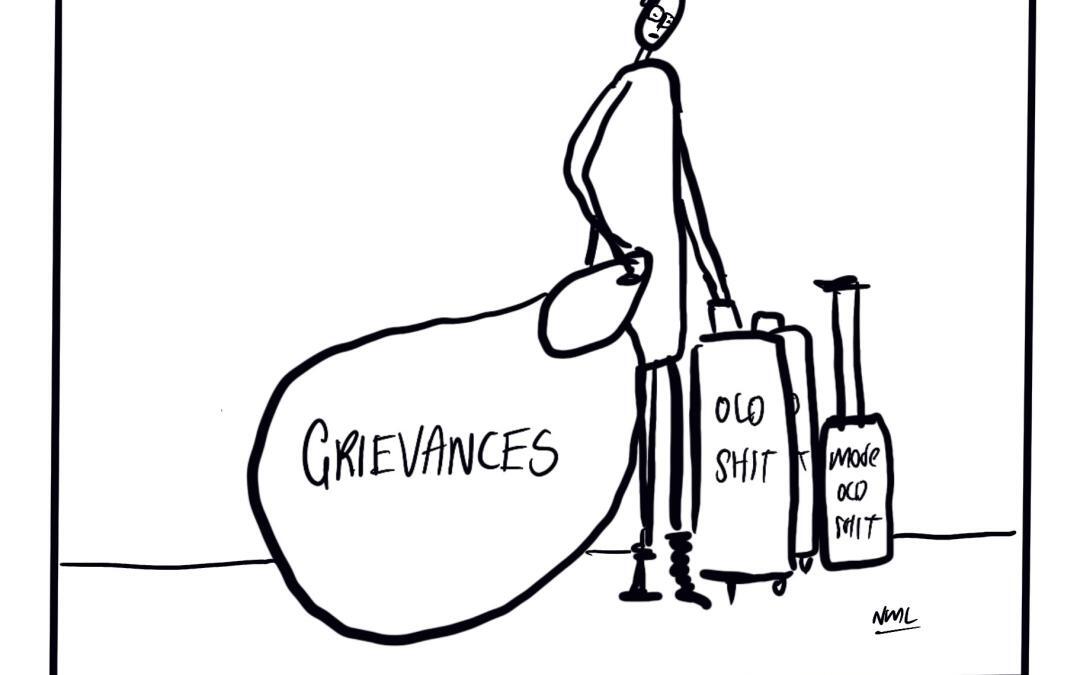Thanks to Marie Kondo, ridding ourselves of anything that we don’t truly need or that doesn’t “spark joy” is something millions of people have attempted. Most of us are uncomfortable with the idea of being a hoarder. It conjures up all sorts of imagery. Yet, we don’t pay enough attention to the resentments, including grudges, we cart with us from argument to argument.
These are circular disagreements: resurrecting old grievances by throwing them on the bonfire of a new argument.
We go round in circles because we keep giving an issue new life. It’s not just that we find ways to bring it up or hint at our annoyance; we ruminate, causing us to stew and stoke the grievances flames.
Why do we harbour old disagreements, almost saving them to drag out in our next conflict?
Despite essentially being on the same team in our intimate relationships, conflict speaks to a part of us that takes on an eat-or-be-eaten mentality. We want to win, be right, and feel like the “less at fault” one or the injured party. Unfortunately, this means that we’ lawyer up’ and will sometimes drag in everything but the kitchen sink to thwart our opponent and win ‘the case’.
The problem, of course, is that they’re our loved ones, not our enemies. After all, with people with who we fear a loss of reputation or instances where we know it would be churlish or petty to bring up the past, we don’t. It’s why we tend to resist engaging in circular disagreements at work. We do our best to stick to the issue at hand, even if it’s with gritted teeth.
With circular disagreements, we ignore relevance to the current issue or even how old and seemingly previously resolved it was. It’s all about evidence. “Look! Here’s proof that you’re clueless!” Or, “Let me present Exhibit A-Z of that massive screw-up. You haven’t paid for it enough yet.” Or, “If you’re going to highlight my old error, right back at ya!”
Most disagreements drag on, not because we’re trying to understand each other’s perspective or reach a resolution but because we’re arguing about how we’re arguing. When we resurrect a circular disagreement, they retaliate. Or, we perceive them pointing out the unfairness or immaturity of our argument as retaliation. And round and round we go.
Even if bringing up old stuff could underscore or reinforce our current point, doing so sparks more conflict.
It detracts from our position (causing further defensiveness) and alienates our loved ones. If we see our goal as winning, being right, etc., someone has to be the loser, wrong, more at fault, or the perpetrator. Fine for battles and courtrooms, but not so great for our intimate, loving relationships.
A universal principle applies to all conflicts in intimate relationships: It’s not about who’s right but what’s right for the relationship.
Done too often, circular disagreements hamper the growth of our relationship. They can damage trust and create reticence around raising issues, admitting mistakes and letting things go. After all, if something’s going to keep coming up, why attempt to change? Why try to resolve things?
For better or worse, our conflict management and resolution habits are our attempts at self-protection. When we address or avoid conflict in ineffective and unhealthy ways, these mentalities, attitudes and behaviours are manifestations of our emotional baggage.
So, how do we get off the merry-go-round of circular disagreements?
Leave arguments where we left them.
Accept that it’s ‘done’ when the disagreement ends. Or we need to admit that we didn’t fully express ourselves and that a resolution wasn’t reached so that we can broach a constructive discussion. These options are way better than drip-feeding hints about our discontentment or resentment about something. Being willing to park arguments is vulnerability in action. We have to not just feel our feelings and be honest with ourselves but also extend trust.
Acknowledge the baggage behind it.
Where did you learn to disagree in this way? What or who else do your current feelings or disagreements remind you of from the past? How do past experiences of conflict affect your management of disagreements? What is your fear of “losing” or letting go really about? The truth is, some of the drivers behind our circular disagreements have nothing to do with that person. Becoming aware of our emotional baggage and how it shows up in conflict allows us to recognise longstanding resentments towards others that have made their way into other relationships. Our romantic partner, for instance, isn’t the person to attempt to ‘make up’ for the arguments we didn’t win with a sibling.
Stick to the subject at hand.
Resist the temptation to present evidence. Yes, this also means resisting the urge to retaliate when they go circular. “Yes, I know that, but let’s stick to the topic at hand.” Or, “I thought we’d agreed to let that go. Do we need to talk that through?”
What’s the resolution?
Sometimes we don’t express what we’ve learned, what we want to change or that we were disappointed by how they/we handled a past issue. And sometimes, we don’t acknowledge that there isn’t a resolution because it was a misunderstanding and humanness. Very often, it turns out, the resolution is being willing to let go of the need to have behaved perfectly in the past so that the relationship, including disagreements, can evolve.
Remember: if you don’t go circular or take the bait, a circular disagreement can’t keep burning!
The Joy of Saying No: A Simple Plan to Stop People Pleasing, Reclaim Boundaries, and Say Yes to the Life You Want (Harper Horizon/HarperCollins) is out now and available in bookshops on and offline. Listen to the first chapter.

 Add to favorites
Add to favorites 
